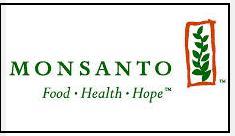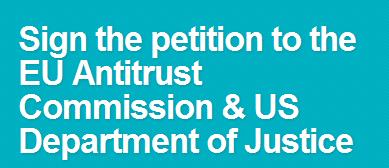In April Bloomberg business news carried news of American consumers increasingly seeking milk and food products free of GM ingredients and of the surge in GM-free imports – 33% imported from sensible Romania where many communes and four cities have declared themselves GMO-free. In an increasingly urgent quest to restore profit, the BBC reports that the Beijing News and the Beijing Times, urge Chinese shoppers to “discard their prejudice” against GM foods as part of a government campaign. An online search will show many reports that imports of GM food have been rejected or ‘approval suspended’ by China, Japan, South Korea and Russia.
So the industry turns yet again to Europe. On the sadly emasculated Farming Today radio programme, a spokesman with a clear vested interest (see endnote) says that it’s now ‘morally wrong’ not to allow farmers to use GM technology to feed a growing population.
Are Monsanto’s insecticides and herbicides beyond reproach?
One argument on the blurb is that farming that relies on pesticides is no longer acceptable. It fails to mention insect resistance to use of Monsanto’s insecticides and the fact that Monsanto’s seeds rely on the use of its herbicide Roundup (toxic glyphosate) which a report published recently in the journal Lancet Oncology, by researchers for WHO’s International Agency for Research on Cancer, said was probably carcinogenic to humans, farmers, forestry workers and domestic gardeners – a damaging conclusion which Monsanto has called on WHO to retract.
In addition to this health concern there is the environmental and agricultural problem recorded earlier on this site, which carried recent news of Monsanto’s reduced profits due to increasing weed resistance to Roundup; USDA records that 14 glyphosate resistant weed species have been documented in the US.
Lying by implication – the writer has been driven to capitalise for emphasis
Representations made on the BBC website by Stephen Tindale:
- scientists should be able to develop GM technology – whereas there are BATTALIONS of highly paid scientists doing just that;
- those who oppose it presented as weak-minded idiots. Campaigners are reported as saying – on the blurb – that not enough is yet known about its potential harm to the environment and the public – whereas there are MASSES of evidence of potential harm; for one example see links to WHO and USDA evidence of weed resistance.
How often must all these tired allegations be refuted? Will campaigners eventually cease though sheer boredom (the writer is wilting) – and will the destructive profit motive triumph?
–
In 2005 after leaving Greenpeace, Stephen Tindale announced his support for nuclear power and GM crop technology. He co-founded ‘currently unfunded’ Climate Answers, has been a consultant for RWE, one of Europe’s five leading companies, generating electricity from gas, coal, nuclear and renewables, and is an Associate Fellow at the Centre for European Reform in which corporate donor, Bayer, represents GM interests.
–




Recent Comments